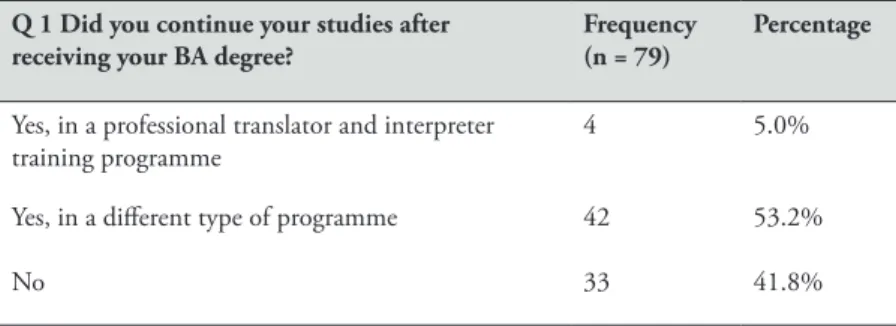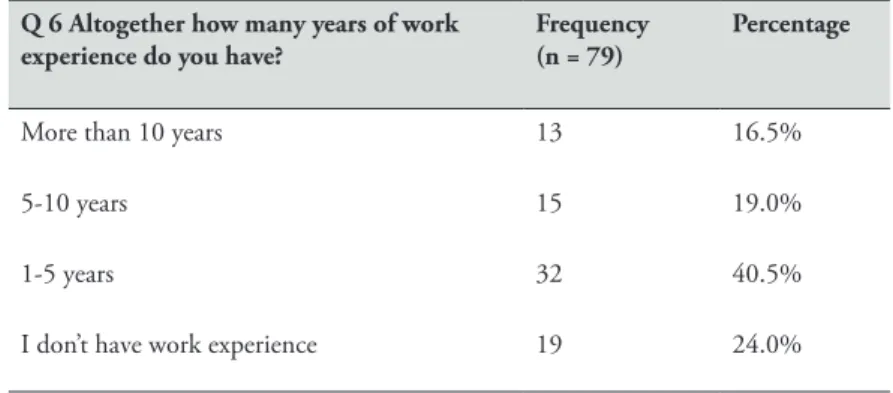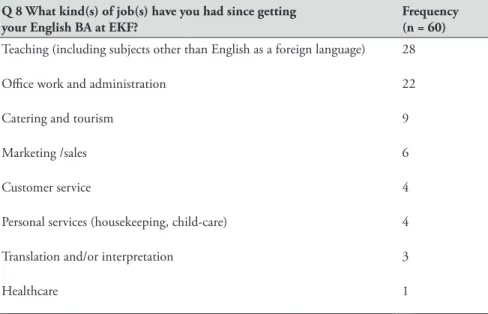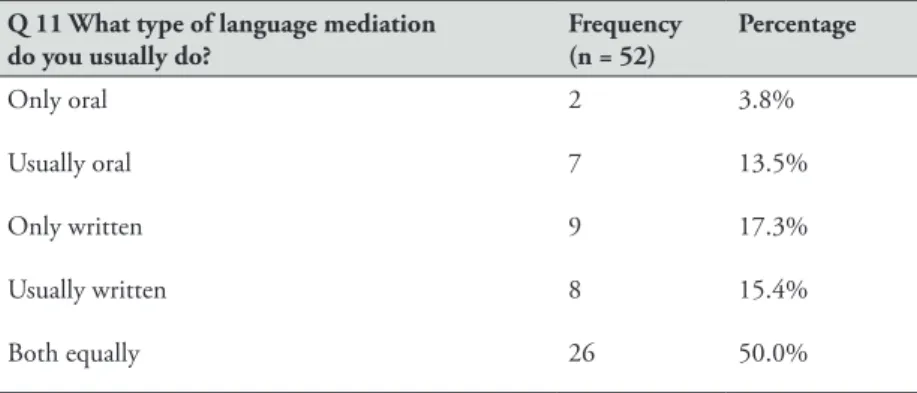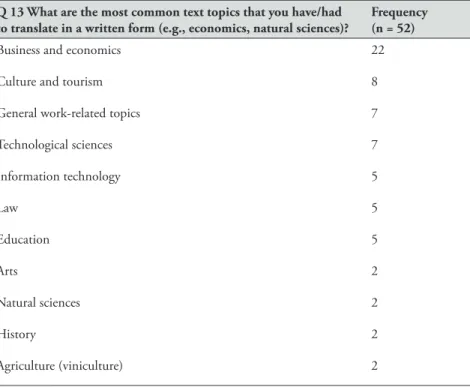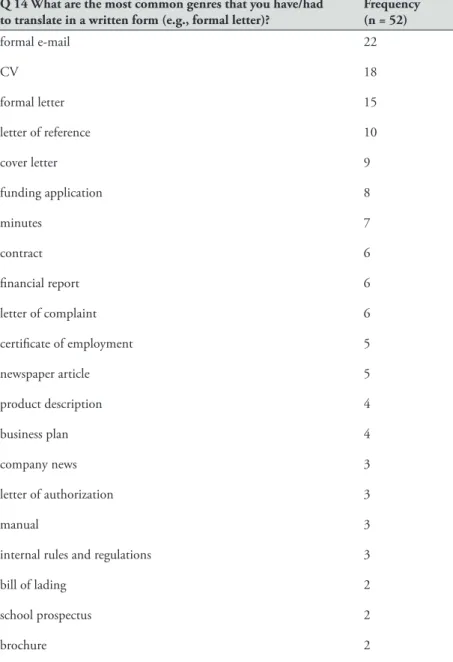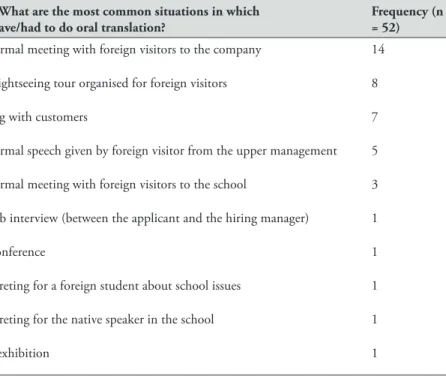The Role of Translation and EU-Texts
in the English BA Programme: Exploring Hungarian College Graduates’ Work Experiences and Views
Adrienn Károly
University of Jyväskylä, Finland
Despite recent convincing arguments emphasizing the benefits of using translation in foreign language learning and teaching, there is little empirical research focusing on existing educational practices. This study aims to fill this gap by investigating the case of an English bachelor’s programme at a Hungarian college, which has integrated translation and specialised EU-texts into the curriculum in a systematic way in an attempt to stay abreast of the current global social transformations and address local needs. The participants of the survey were graduates of the English BA programme who have completed the optional EU specialisation module.
The research aimed to find out about graduates’ further educational choices and their subsequent employment experiences regarding translation and the use of EU-texts. It also sought to capture graduates’ perceptions about the relevance and role of the EU and EU translation courses as well as the whole EU specialisation module within the English BA programme. The results indicate that written and oral translation tasks are frequently required at the workplace, and graduates often have to deal with EU-related topics. The findings seem to support the argument that using translation and specialized texts serves useful purposes in curriculum of the English BA. The research results can be utilized when revising and adjusting the aims and content of the courses.
1. Introduction
Contemporary research trends suggest a growing awareness of the fundamental role of translation as a form of everyday interaction between individuals and groups, as well as between local languages and cultures and the global English-speaking community. Particularly in multilingual and multicultural contexts individuals who are not translation professionals increasingly engage in various formal and
informal translation activities in a range of domains for a variety of purposes, and often on an ad hoc basis (e.g., Cook 2010; Pennycook 2008; Phipps and Gonzalez 2004; Pérez-González and Susam-Saraeva 2012). In fact, workplace expectations regarding translation skills seem to have changed similarly to basic IT skills, which were considered highly specialized expertise in the past, possessed only by professionals, while today they are viewed as essential competences required by most employers (Calvo 2011; Witte 2009). Nevertheless, the use of translation in foreign language learning and teaching is a widely debated theoretical issue, and its potentials remain generally unexploited in practice. This is particularly true in the mainstream global practice of English Language Teaching (ELT), which is still dominated by theories and norms stemming from monolingual principles (Hall and Cook 2012).
According to Cook (2010), however, using communicative translation activities in foreign language learning and teaching seems to embrace more general curriculum philosophies. From this perspective, translation not only equips students with useful knowledge and practical skills, but promotes positive social values, offers students possibilities for intellectual and personal development, and helps preserve, extend, and transmit theoretical knowledge. Along the same line, Kemp (2012) has convincingly argued that translation should become a more integral part of the modern languages degree because it serves three useful purposes at the same time:
it supports language learning, it is a valuable and transferrable skill in its own right, and it complements (and integrates) different areas of study within the program.
Requiring and enhancing critical analysis and self-reflection, it enables cross- curricular learning, thus making the language degree a better integrated whole.
As Peverati (2013) has pointed out, these translation courses need to be well integrated with the whole curriculum and properly aligned with the overall learning outcomes of the programme. Instead of pursuing a purely vocational goal, which might lead to unrealistic and false expectations, Peverati argues that these courses should consider the diversity of translation activities along with different levels of translation quality in real-life situations, which require different levels of competences.
Recently, researchers have started to emphasize that the goals of foreign language learning have significantly changed as a result of global social changes.
In general, learners of English as a foreign language do not (necessarily) aim to achieve near-native (linguistic) proficiency, and – particularly in the European context – they typically communicate with non-native speakers of English. Thus, in foreign language learning and teaching, especially at more advanced levels, it is essential to focus on critical cultural awareness (Byram 2009). According to Kramsch (2006:103), advanced foreign language competence should refer to “the ability to translate, transpose and critically reflect on social, cultural and historical meanings conveyed by the grammar and lexicon”. Kramsch (2011) also argues that
the primary goal of advanced foreign language teaching is that language learners acquire a sophisticated symbolic competence, which helps them interpret complex messages and reflect on what discourse reveals about the mind and intentions of other individuals, groups, or communities. This can help them understand their own individual and collective (group/cultural) identities at a deeper level.
Since foreign language learning (and language use) refers to cultural encounters, intercultural competence models, which view communication from a wider, socio- cultural perspective, enable seeing translation not merely as professional text production but as a diverse form of human interaction. Thus, they seem to be more suitable for describing language competence than traditional language competence models that have a monolingual orientation. Furthermore, Pennycook (2008) has pointed out that the English language, in particular, cannot be viewed in isolation, but needs to be seen in the context of other languages (it is ‘a language always in translation’). Following from this, language teaching appears to be inevitably tied to translation, which is the manifestation of the complexity and diversity of meanings. This idea explicitly appears in the report of the Modern Language Association Ad Hoc Committee on Foreign Languages (2007), which lists future priorities for language departments and programmes, and claims that “[t]here is a great unmet demand for educated translators and interpreters, and translation is an ideal context for developing translingual and transcultural [italics added] abilities as an organizing principle of the language curriculum” (2007: 243). Translation, a creative activity requiring criticality and reflexivity, seems to be an effective means to achieve these goals by bringing two languages and cultures into the classroom, which vividly demonstrates the diversity of meanings and worldviews as well as the complexity of intercultural communication (Illés 2011, Widdowson 2003).
Regarding the use of specialized texts, Klaudy (2004) pointed out already a decade ago that as a result of Hungary’s EU accession, using EU-texts (in a broad sense) should become an integral part of foreign language education at the tertiary (or even secondary) level. After the Bologna reforms in 2007, most English bachelor’s programs in Hungary built translation and/or ESP (including English for EU purposes) courses into the curriculum, similarly to other European countries.
The study reported in this paper focuses on the English bachelor’s programme at Eszterházy Károly College (EKF), Eger, in which translation courses are integrated into the English bachelor’s degree and are part of an EU specialization module. The main goal of these courses is twofold: besides improving foreign (and native) language proficiency, they set out to develop students’ translation skills in a functional and communicative way. Thus, translation is viewed not simply as a language learning tool, but as a useful and practical skill in itself. This situation is essentially different from professional translator training because the primary
aim is not to prepare students for the translation market to work as professional translators (although it is certainly one possibility in the future if students choose to go on to professional training and/or take a qualifying exam). Students graduating from these programs typically find a wide variety of jobs in different fields, where they need not only a high level of foreign language competence, but should also be able to use their native language effectively and appropriately as well as carry out various oral and/or written language mediation tasks. Therefore, these courses should be based on a coherent and systematic framework tailored to the students’
level, needs, and interest as well as workplace expectations.
The main objective of the survey is to explore graduates’ educational and work experiences regarding translation and EU-texts following graduation, which can provide useful information when revising and adjusting the content and methodology of the courses. More specifically, the study addressed the following research questions:
• What are the educational and employment choices of former students of the English BA program following graduation and what are the motivational factors underlying these choices?
• What are graduates’ experiences with regard to language mediation (oral or written translation) at the workplace?
• What are graduates’ experiences of EU-texts and topics and their oral or written translation at the workplace?
• How do graduates perceive the usefulness of EU English and EU translation courses within the EU specialisation module in light of their subsequent educational and/or work experiences?
• How do graduates perceive the value of the EU specialisation module within the English BA program in the light of their subsequent educational and/or work experiences?
2. Methodology
2.1 Setting and participants
The questionnaire study was conducted at the end of 2012. The participants are full-time and part-time graduates of the three-year bachelor’s programme in English Studies at Eszterházy Károly College, Eger, Hungary. The programme started in the academic year 2007/2008, after the introduction of the Bologna Reforms aiming to harmonise European higher education. The BA program included an optional
50-credit EU specialisation module that could be chosen by the students at the end of the first year. The module consisted of the following five subjects: rhetoric and stylistics (two courses), communication skills (three courses), English for EU purposes (six courses covering a wide range of issues related to the working of the EU, including its institutional structure and various policy areas, and a lecture giving a historical overview of European integration), theory and practice of specialised translation (six courses, three lectures focusing on theoretical issues and three seminars providing practice in general and EU translation). The lectures and seminars ran parallel and were designed to complement each other.
At the time of the survey, the total number of students who had completed their English BA studies (including the EU specialisation) was 120. They started the EU specialisation module in the academic years 2007/8, 2008/9 and 2009/10. Out of the total population, 112 participants could be contacted through e-mail, which was the total sample used in the survey. The questionnaire was administered online, and the response rate was 70.5 per cent, with 79 graduates completing and returning the questionnaire. Sixty-six respondents (83.5 per cent) were female and thirteen (16.5 per cent) male, and their age ranged between 22 and 43 (with a mean age of 27.8 years). At the time of the survey, 73 respondents were residing in Hungary, while six of them were living and working abroad (Ireland, Germany, USA, and UK). Their graduation year was between 2009 and 2012. Forty of them completed their studies in the full-time program (50.6 per cent), thirty-five in the part-time program (44.3 per cent), two started in the full-time program but finished in the part-time program, and two started in the part-time program but graduated from the full-time program.
2.2 Instruments of data collection and procedures of analysis
Data was collected through an online questionnaire, which consisted of five questions eliciting background information, followed by thirty-one closed and open-ended questions grouped into three main categories: (1) students’ post- graduation educational choices, (2) their employment profile and work experiences regarding translation and EU texts, and (3) their perceptions of the usefulness of the EU and translation courses as part of their English BA studies. The initial version of the questionnaire was given to three experts for review to identify potential problems related to wording, the order of the questions and the use of terms. The pre-test phase also included a focus group discussion with five students studying in the programme at the time of the research (they were not included in the population) to see their understanding of and reactions to the questions, which were then refined on the basis of their feedback. The final version was piloted by
seven other students who were studying in the specialisation programme but had not completed their studies yet. The language of the questionnaire was Hungarian, which enabled the respondents to express their ideas in the most natural way.
The questionnaire also included sub-questions, thus the number of respondents per question varied throughout the questionnaire. Numerical data was analysed with descriptive statistical methods (calculating frequencies, percentages and means), while in the analysis of narrative data major themes and categories were identified and coded manually.
3. Results and discussion
The first part of the questionnaire focused on the participants’ educational choices following graduation from the English bachelor’s programme. The first three questions (Q 1–3) aimed to find out the number of graduates who continued their studies after completing their bachelor’s degree as well as their concrete study choices (Table 1).
Table 1. Students’ further educational choices after graduation Q 1 Did you continue your studies after
receiving your BA degree?
Frequency (n = 79)
Percentage
Yes, in a professional translator and interpreter
training programme 4 5.0%
Yes, in a different type of programme 42 53.2%
No 33 41.8%
Altogether forty-six respondents (58.2%) decided to continue their studies after getting their bachelor’s degree, including four respondents who enrolled in professional translator and interpreter training programmes at various institutions (one student at Eötvös Loránd University, Budapest, one at Kodolányi János College, Székesfehérvár, and two at the University of Miskolc). The institutional choices of those who continued their studies but not in professional translator and interpreter training include different programmes in various institutions, mainly in Hungary.
The most popular choice seems to be master’s programmes related to their BA studies.
Twenty-six of the respondents decided to stay in Eszterházy Károly College in the master’s programmes in English with teaching qualifications or in the American Studies master’s programme. Seven respondents continued their studies in the
English Teacher and American Studies master’s degree programmes at Eötvös Loránd University, one in the master’s programme in English studies at the University of Debrecen, and one in the same programme at the University of Szeged. The rest of the answers indicate that programmes related to business and tourism were also popular choices, such as Tourism Manager or Cultural Heritage Studies at Eszterházy Károly College, International Business Administration at the College of Szolnok, and International Relations at the Budapest Business School (each chosen by one student).
Question 4 was targeted only at those who continued their studies, but not in professional translator and interpreter training, and those who decided not to study further. The question was related to their plans and motives to enrol in professional translator and interpreter training programmes in the future. Based on their responses (Table 2), one-fifth of this group (fifteen people) is planning to undertake such studies, and almost half of the group (thirty-five people) did not rule out the possibility.
Table 2. Graduates’ plans to pursue further studies in professional translator training Q 4 Are you planning to enrol in
a professional translator and interpreter training programme in the future?
Frequency
(n = 75) Percentage
Yes 15 20.0%
No 25 33.3%
Maybe 35 46.6%
The main reasons given as justification for the responses were related mainly to the usefulness of this qualification. Several respondents think that official qualification means better and more job opportunities. A recurring comment was that the situation of teachers is very uncertain in Hungary, which forces teachers to seize any other available job opportunity. Translation is usually seen as an attractive second job, which can be done even alongside teaching. Four respondents mentioned that they had already done translation and/or interpretation work informally, but they felt they needed an official qualification. In their opinion, this would also help them to improve their skills and make them a better and quicker translator. The attractive and challenging nature of translation – both as an activity and as a profession – was also frequently mentioned. Twenty-five people, however, responded that they did not plan to pursue further studies in translation, and cited reasons such as lack of interest, motivation, abilities, financial resources, and time.
Those who were working as teachers emphasised that they were more interested
in teaching, or they felt they would not need this skill in their current job. Finally, three respondents mentioned that they were planning to work abroad in the future, and felt that translation would not be a useful skill outside Hungary.
The next group of questions (Q 6–8) focused on the respondents’ total length of work experience, their current employment status, and their employment history after receiving their English bachelor’s degree. The responses indicate heterogeneity in terms of the total length of work experience (Table 3).
Table 3. Total length of graduates’ work experience Q 6 Altogether how many years of work
experience do you have? Frequency
(n = 79) Percentage
More than 10 years 13 16.5%
5-10 years 15 19.0%
1-5 years 32 40.5%
I don’t have work experience 19 24.0%
About one third of the respondents had more than five years of work experience, including fifteen people having worked for five to ten years, and thirteen people who have spent more than ten years on the labour market. Most probably, this group includes those who completed their English bachelor’s degree in the part-time programme, and were working before and/or during their studies. Furthermore, about two-fifths of the respondents had one to five years of work experience, including most likely younger students who studied in the full-time programme although some people from younger age groups also preferred to study part-time.
Finally, almost a quarter of the respondents did not have any work experience.
Presumably, these people include three groups: those who decided to continue their studies after getting their bachelor’s degree, those who did not wish to study further but could not find a job, and those young women who went on maternity leave right after obtaining their bachelor’s degree.
The next question (Q 7) was targeted only at those who had some work experience (altogether sixty respondents), and inquired about their current employment status.
The majority of them (fifty-three people, 88.3%) were employed at the time of the survey, while seven (11.6%) had previous work experience, but were not employed when they completed the questionnaire.
The next question (Q 8) was also addressed to this group (altogether sixty people), and aimed to find out what types of employment they had had (including their current job) since receiving their English bachelor’s degree. The respondents mentioned a wide variety of occupations (Table 4).
Table 4. Graduates’ employment experiences after obtaining their English BA degree Q 8 What kind(s) of job(s) have you had since getting
your English BA at EKF? Frequency
(n = 60) Teaching (including subjects other than English as a foreign language) 28
Office work and administration 22
Catering and tourism 9
Marketing /sales 6
Customer service 4
Personal services (housekeeping, child-care) 4
Translation and/or interpretation 3
Healthcare 1
Based on the responses, teaching (including other subjects as well) seems to be the most commonly chosen occupation, including jobs in public schools and private language schools. It has to be noted that some of the respondents studied in the part-time programme, and already had another (sometimes teaching) degree.
The next most frequent occupations are office/administrative jobs and work in the field of catering and tourism. Jobs related to marketing and sales were also quite typical, with six participants citing them. Other occupations listed include jobs in the field of marketing/sales, customer service, personal services, translation and/or interpretation, and healthcare. It is interesting to see that even though an English BA degree does not qualify graduates to translate, three of them mentioned that they had already worked in this field although they did not specify these jobs in detail. Overall, the wide variety of jobs mentioned in response to this question indicates that there are several employment options available for a graduate with an English BA. Many of these jobs require a good command of the foreign and the native language, but several other practical skills are needed in these jobs, such as good oral and/or written communication skills.
The next seven questions (Q 9–15) were focusing on the participants’ experiences with oral or written language mediation at the workplace (these questions were targeted only at those who already had some work experience). The first question aimed to find out if the participants had to do oral or written translation in their work. The results (Table 5) indicate that language mediation is a frequently required task at the workplace.
Table 5. Language mediation tasks at the workplace Q 9 Have you ever had to do written language
mediation (translation) or oral language mediation (interpretation) tasks at the workplace?
Frequency
(n = 60) Percentage
Yes 52 86.6%
No 8 13.3%
Interestingly, the number of those who had already had to use either written or oral language mediation tasks is very high (fifty-two). This indicates that language mediation skills are expected in several jobs. The next question (Q 10) was addressed to those respondents whose had to use language mediation (written or oral translation) in their jobs (n=52), and aimed to find out how frequently they had to do language mediation tasks from English into Hungarian or Hungarian into English. It is clear from the responses that language mediation skills are very often (15 people) or often (34 people) required also in non-translation/interpretation jobs.
The next question (Q 11) focused on the types of language mediation that are most typically required at the workplace with regard to the channel. Interestingly, half of the respondents indicated that they had had to use both written and oral mediation, while one third of the respondents said they had to do only or usually written translation, and about a fifth of them mentioned only and usually oral translation (Table 6).
Table 6. Channel of language mediation tasks at the workplace Q 11 What type of language mediation
do you usually do? Frequency
(n = 52) Percentage
Only oral 2 3.8%
Usually oral 7 13.5%
Only written 9 17.3%
Usually written 8 15.4%
Both equally 26 50.0%
The results indicate that both oral and written language mediation tasks are expected at the workplace. The frequency of oral language mediation tasks is particularly interesting because oral skills were not given such a strong emphasis in the translation courses during their studies. The responses to the question related to the direction of translation (Q 12) indicate that translation from English into Hungarian is more common than from Hungarian into English. A little more than half of the respondents mentioned that they had to translate only from English into Hungarian (28 people), while the rest of the respondents (24 people) reported that from English into Hungarian is the most usual direction, which, however, implies that occasionally they also have to translate from Hungarian into English.
The next question focused on written translation, and aimed to explore the most common topics that the respondents had to translate in the workplace.
The results indicate that they have or had to translate a wide variety of subject areas, which are listed in Table 7.
Table 7. The most common domains encountered in written translation Q 13 What are the most common text topics that you have/had
to translate in a written form (e.g., economics, natural sciences)? Frequency (n = 52)
Business and economics 22
Culture and tourism 8
General work-related topics 7
Technological sciences 7
Information technology 5
Law 5
Education 5
Arts 2
Natural sciences 2
History 2
Agriculture (viniculture) 2
The most common subject area mentioned is business and economics, followed by culture and tourism, general work-related topics, and topics in the field of technological sciences. Other domains mentioned were IT, law, education, EU, arts, natural sciences, history and agriculture. Besides, several participants mentioned that they often had to deal with EU-specific terms when translating texts with various topics. It seems that incorporating texts with topics belonging to the most frequently mentioned domains can provide useful practice for students because in their future job there is a high chance that they would meet similar texts. In addition, there are several EU-texts dealing with these topics, which could also be used.
The next question (Q14) was related to the genre of the texts that the respondents had to translate in writing. A summary of the responses is presented in Table 8.
Table 8. The most typical genres encountered in written translation Q 14 What are the most common genres that you have/had
to translate in a written form (e.g., formal letter)? Frequency (n = 52)
formal e-mail 22
CV 18
formal letter 15
letter of reference 10
cover letter 9
funding application 8
minutes 7
contract 6
financial report 6
letter of complaint 6
certificate of employment 5
newspaper article 5
product description 4
business plan 4
company news 3
letter of authorization 3
manual 3
internal rules and regulations 3
bill of lading 2
school prospectus 2
brochure 2
Responses indicate that the participants often have to translate formal business documents at the workplace. Therefore, it seems to be beneficial to incorporate these genres as much as possible in the translation courses and focus on the differences between the Hungarian and English genre conventions, including the specific lexical items typically occurring in these texts. Most of these genres are also commonly used by EU institutions (e.g., formal letters, minutes, contracts, internal rules and regulations), or have EU-related topics (e.g., newspaper article, brochure).
The next question focused on the most typical situations in which the respondents had to translate orally. The responses to this question are summarised in Table 9.
Table 9. The most typical oral translation situations Q 15 What are the most common situations in which
you have/had to do oral translation? Frequency (n
= 52) at a formal meeting with foreign visitors to the company 14 on a sightseeing tour organised for foreign visitors 8
dealing with customers 7
at a formal speech given by foreign visitor from the upper management 5 at a formal meeting with foreign visitors to the school 3 at a job interview (between the applicant and the hiring manager) 1
at a conference 1
interpreting for a foreign student about school issues 1 interpreting for the native speaker in the school 1
at an exhibition 1
Results indicate that the most typical oral translation situations are formal meetings, when a foreign person visits the company. Among the responses, we can find other formal situations related to business communication, but oral translation seems to be quite frequent also in schools. English teachers are particularly often asked to act as interpreters on these occasions even if the foreign visitors are not English since English is most probably used as the language of communication between non-native speakers. The naïve belief that people who speak a foreign
languages can easily interpret seems to be still widespread in Hungary. Therefore, English BA students can definitely benefit from training this special skill through oral translation activities incorporated into translation classes.
The next group of questions (Q 16–25) was related to English or Hungarian EU-related texts or topics at the workplace, more specifically the written translation of texts and the oral translation of topics related to the EU. The first question (Q16) aimed to find out if the respondents have met written texts that had EU topics. It is important to emphasise that the question included not only official EU documents but also any text that had an EU-related topic. The responses indicate that a little less than half of the participants have had to work with EU texts, while sixty per cent have not encountered such texts at the workplace (Table 10).
Table 10. Experiences with English or Hungarian written EU texts at the workplace Q 16 Have you ever had to deal with English
or Hungarian written texts with EU-related topics? Frequency
(n = 60) Percentage
Yes 24 40.0%
No 36 60.0%
The next question was targeted at those who have met EU-related written texts, altogether twenty-four participants, and enquired about the frequency of working with these texts. Nine of those surveyed indicated that they had to work with written EU-texts very often, while fifteen of them marked ‘often’. One respondent who works as a teacher mentioned that he or she has met EU-related texts often when preparing students for language exams.
Question 18 focused on the subject matter of these written EU-texts. Responses show that participants have met a wide variety of topics (Table 11), but the two most common topics are related to various EU institutions and EU policies.
Table 11. The most typical topics of written EU texts Q 18 What is/was the topic of these written EU-texts
(e.g., economics)? Frequency
(n = 24) EU institutions and their general function 7
Various EU policies 7
Economics 5
EU legislation 5
EU foreign and regional policy (including Hungary) 4
Social policy 3
Education 3
Environmental protection 2
Tourism, culture 2
In response to the next question (Q 19), which was related to the genre of these texts, twelve participants indicated that they have encountered EU legislative texts (laws), six of them mentioned general texts for teaching purposes (mainly about the structure of the EU, its institutions and the main EU policies), five respondents listed newspaper articles and four of them applications for EU funding. With regard to the most typical language of these texts (Q 20), out of the twenty-four respondents, sixteen mentioned that they had met both English and Hungarian EU-texts, and eight of them indicated that the typical language was English.
The next question (Q 21) focused on the written translation of EU-related texts.
Out of the twenty-four respondents, ten replied that they had translated such texts in the workplace, while fourteen gave a negative response (Table 12).
Table 12. The occurrence of written translation of texts that had EU-related topics Q 21 In your work, have you ever had
to translate EU-related texts in writing? Frequency
(n = 24) Percentage
Yes 10 41.6%
No 14 58.3%
With regard to the frequency of this task, explored in Q 22, two of the ten respondents mentioned that they had to translate texts with EU topics very often although this was typical only in translation jobs. However, eight respondents, working in other jobs, indicated that they often had to translate EU-related texts in writing.
The next two questions (Q 23 and 24) aimed to explore the most typical text genres and topics in the case of the translation of EU-related texts. The most common genres that the respondents had reported included EU legislation, official EU documents and official non-EU documents with EU-related topics, while the most frequent text topics mentioned were related to law, economics, education, social policy and tourism.
The next three questions (Q 25–26) focused on the oral translation of EU-related issues. It seems that this is not a typical language mediation task at the workplace as out of the sixty respondents, only one encountered this situation as part of his/
her interpretation job. The topic of the oral translation was the EU’s policy on environmental protection.
The last four questions (Q 27–31) aimed to explore graduates’ perceptions about the usefulness of the English for EU purposes (EU 1-6) and the EU translation courses. The responses given to questions 27, 29 and 31 are summarised in Table 13.
Table 13. Graduates’ responses concerning their perceptions about the usefulness of EU courses, translation courses and the EU specialisation module
within the English BA programme
Regarding the usefulness of the courses and the specialisation programme, the responses seem to indicate that most graduates find them very useful or useful, particularly the EU courses and the EU translation courses, while the overall perception about the usefulness of the whole EU specialisation programme is a little lower. When analysing the justifications given by the participants, six main themes emerged. One group mentioned that these courses provided them with useful and transferable knowledge, which is indispensable in Hungary, being a member state of the EU. Therefore, the knowledge related to the structure of the EU and the EU institutions as well as their functions seems to be extremely valuable. The usefulness of EU vocabulary was another recurring theme, particularly the benefits of learning specialised vocabulary in the field of business and economics. Another group of participants mentioned that these courses proved to be beneficial for their overall English language competence. In addition, two respondents indicated that it was very good that they could write their BA thesis on EU-related issues, for which these courses were indispensable. Finally, according to a group of respondents, the EU courses provided an excellent foundation for those interested in professional translation and/or interpretation.
One justification given for the less positive responses was that even though the EU courses were interesting and generally useful, they had not had to use this knowledge during their work. A few respondents would have preferred more translation and fewer general EU courses, while one according to one respondent, the EU courses did not go deeply enough due to the limited number of hours. One respondent mentioned that some of the topics discussed in the classes were not particularly interesting for him or her, and one respondent would have liked more focus on EU funding applications. Finally, two respondents said that more student- centred, practical and interactive teaching methods in all the courses would have been more motivating.
Regarding the usefulness of the EU translation courses, the responses were more diverse. The most general comments were related to the benefits of developing general and specific vocabulary, gaining useful and relevant knowledge about the EU through translating various texts, and improving their translation skills, which are very often required at the workplace. Some respondents mentioned that the translation courses helped them to develop their foreign language competence in general, as well as to express their ideas in Hungarian more accurately and appropriately. Similar to the EU courses, several respondents mentioned that the translation courses provided a solid basis for continuing their studies in professional translation and/or interpretation. A few respondents emphasised that translation should be part of every language teaching programme as it is the most practical and transferable skill. Some comments highlighted the benefits of getting detailed and
motivating feedback in various forms, which helped them to develop precision and the skill of using of online resources. Finally, a few students found the translation theory classes particularly interesting as they gained more insight into translation as an activity. Some of the negative responses included comments related to the lack of personal interest in translation. Another common reason for a negative response was that the particular respondent had not had to use translation in their workplace. Another complaint was that in spite of the high level and the difficulty of the courses, they did not get any official certificate at the end of the specialisation module. Moreover, two respondents mentioned that they would have liked to deal with some more general texts as well as do more oral translation activities during the courses. Finally, some respondents mentioned that the number of hours was too low, so the translation courses could only give them a general introduction to translation. These remarks could provide guidance for the teachers of the courses to adjust the content and the teaching methods to meet students’ various needs and expectations, and thus making the whole specialisation programme more relevant and attractive for the students.
4. Conclusions
The results of the questionnaire survey can provide valuable information for teachers and course designers when re-examining the content and teaching methods of the ESP (EU) and translation courses in the EU specialization program offered within the English BA. The findings can help to meet both students’ and employers’ needs and expectations, thus making the EU specialization programme – and the whole English BA – more relevant and attractive for the students, particularly for those who do not continue their studies. According to the results, this group is rather large, which makes it crucial to align the perspectives of students and the job market.
In the jobs that these students typically have, good communication skills (both in the foreign language and in the mother tongue) as well as the use of formal style appear to be essential. Furthermore, since translation – both oral and written – seems to be a common practice in the workplace, communicative translation activities within the English BA programme can provide authentic learning experiences, through which a number of other practical and transferable skills can be developed.
It seems that translating formal written genres which are related to working life or the EU is also very useful, as well as general oral translation activities. The findings also indicate that professional translator/interpreter training is an attractive study option for students with an English BA, which emphasises the significance of the undergraduate phase.
Since the topic is related to the broader discussion on the role of translation in foreign language learning and teaching, the results of this localized study have wider practical and theoretical implications. The findings suggest that translation and EU-texts have a useful role in the modern foreign language degree. Since empirical research at the interface of translation studies and foreign language pedagogy is still scarce, further investigations are needed in the future, which can offer new insights for both disciplines.
References
Calvo, E. 2011. Translation and/or translator skills as organising principles for curriculum devel- opment practice. JoSTrans 16: 5–25.
Cook, G. 2010. Translation in Language Teaching: An Argument for Reassessment. Oxford: Oxford University Press.
Cook, G. 2010. Translation in Language Teaching: An Argument for Reassessment. Oxford: Oxford University Press.
Hall, G. and G. Cook. 2012. Own-language use in language teaching and learning. Language Teaching 45 (3): 271–308
http://pops.uclan.ac.uk/index.php/jsltr/article/view/91/38
Illés, É. 2011. Translation in communicative language teaching. In: Balogné Bérces K., Földváry K., Mészárosné Kóris R. (eds.), HUSSE10-Linx. Proceedings of the HUSSE10 Conference.
Debrecen: HUSSE, 49–55.
Kemp, S. 2012. Translation studies and the integrated modern language degree. Journal of Second Language Teaching and Writing 2 (1): 121–134.
Klaudy K. 2004. Az EU-szakszövegek fordításának oktatása. In: Dobos Cs. (ed.), Miskolci nyelvi mozaik. Budapest: Eötvös József Kiadó, 11–24.
Kramsch, C. 2006. From communicative competence to symbolic competence. The Modern Lan- guage Journal 90 (2): 249–252.
Kramsch, C. 2011. The symbolic dimensions of the intercultural. Language Teaching 44 (3): 354–367.
Modern Language Association Ad Hoc Committee on Foreign Languages. 2007. Foreign lan- guages and higher education: new structures for a changed world. http://www.mla.org/pdf/
forlang_news_pdf.pdf
Pennycook, A. 2008. English as a language always in translation. European Journal of English Studies 12 (1): 33–47.
Pérez–González L. and Ş. Susam–Saraeva 2012. Non-professionals translating and interpreting.
Participatory and engaged perspectives. The Translator 18 (2): 149–165.
Peverati, C. 2013. Translation in modern language degree courses: a focus on transferable generic skills. InTRAlinea, 15.
http://www.intralinea.org/archive/article/1932
Phipps, A. and M. Gonzalez. 2004. Modern Languages: Learning and Teaching in an Intercultural Field. London: SAGE.
Widdowson, H. 2003. Defining Issues in English Language Teaching. Oxford: Oxford University Press.
Witte, A. 2009. From translating to translation in foreign language learning. In: A. Witte, T. Harden, and A. Ramos de Oliveira Harden (eds.), Translation in Second Language Learn- ing and Teaching. Frankfurt: Peter Lang, 79–98.
